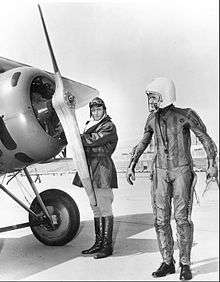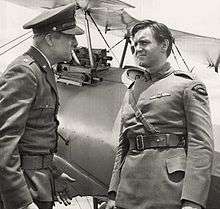The Last Flight (''The Twilight Zone'')
| "The Last Flight" | |
|---|---|
| The Twilight Zone episode | |
 Scene from "The Last Flight" | |
| Episode no. |
Season 1 Episode 18 |
| Directed by | William Claxton |
| Written by | Richard Matheson (based on the short story "Flight") |
| Featured music | Stock from "Where Is Everybody?" by Bernard Herrmann |
| Production code | 173-3607 |
| Original air date | February 5, 1960 |
| Guest appearance(s) | |
| |
"The Last Flight" is episode 18 of the American television anthology series The Twilight Zone. Part of the production was filmed on location at Norton Air Force Base in San Bernardino, California. The vintage 1918 Nieuport 28 biplane was both owned and flown by Frank Gifford Tallman, and had previously appeared in many World War I motion pictures.
Opening narration
| “ | Witness Flight Lieutenant William Terrance Decker, Royal Flying Corps, returning from a patrol somewhere over France. The year is 1917. The problem is that the Lieutenant is hopelessly lost. Lieutenant Decker will soon discover that a man can be lost not only in terms of maps and miles, but also in time - and time in this case can be measured in eternities. | ” |
Plot
Flight Lieutenant William Terrance "Terry" Decker of 56 Squadron Royal Flying Corps lands his Nieuport biplane on an American airbase in France, after flying through a strange cloud. He is taken into custody and questioned by the American base commander, Major General Harper, and his provost marshal, Major Wilson. Decker identifies himself and his squadron and claims that the date is March 5, 1917. He is informed that it is actually March 5, 1959.
Decker tells the officers that he and his comrade Alexander Mackaye were fighting seven German aircraft; Mackaye was shot down and Decker escaped into a cloud. The Americans tell him that Mackaye is alive and is an Air Vice Marshal in the Royal Air Force, a war hero from World War II who saved hundreds, if not thousands of lives by shooting down German bombers over London. The American officers add that Air Vice Marshal Mackaye, in addition to being alive and well, is coming to the base that very day for an inspection. Major Wilson tries to help Decker remember what happened. Decker finally confesses that he has consistently avoided combat throughout his service, and that he deliberately abandoned the greatly outnumbered Mackaye when the two were attacked by the German fighters. He refuses to believe that Mackaye somehow survived against such odds.
When Wilson suggests that someone else helped Mackaye, Decker realizes that he has been given a second chance. He tells the American officer that there was no one within fifty miles who could have come to Mackaye's aid, so if Mackaye survived, it had to be because he went back himself. Knowing he cannot have much time to go back to 1917, Decker pleads with Wilson to release him from custody. When Wilson refuses, Decker assaults him and a guard and escapes. Running outside, he locates his plane, punches a mechanic who tries to get in his way, and starts the plane's engine. He is about to take off when Wilson catches up and puts a pistol to his head. Decker tells Wilson he will have to shoot him to stop him, as he would rather die than remain a coward. After hesitating, Wilson allows him to escape and Decker flies his plane into white clouds and vanishes.
Major Wilson is rebuked by Major General Harper for believing such a fantastic story and for allowing Decker to escape. When Mackaye arrives, Wilson asks he if he knew a man named William Terrence Decker. Mackaye, surprised, says Decker saved his life. In March 1917, Mackaye and Decker were attacked while out on patrol by seven German aircraft. Decker flew off into a cloud, and Mackaye believed at first that Decker had abandoned him. Suddenly, Decker came diving out of the cloud, and proceeded to shoot down three of the German planes before being shot down himself. General Harper shows Mackaye Decker's badge and personal effects, startling Mackaye, who remarks that those items had never been returned by the Germans. Major Wilson suggests that he sit down while they explain how they came into their possession.
Closing narration
| “ | Dialog from a play, Hamlet to Horatio: There are more things in heaven and earth than are dreamt of in your philosophy. Dialog from a play written long before men took to the sky: There are more things in heaven and earth and in the sky than perhaps can be dreamt of. And somewhere in between heaven, the sky, and the earth, lies The Twilight Zone. | ” |
Episode notes
This was the first episode of The Twilight Zone scripted by Richard Matheson. Rod Serling had previously adapted the episode "And When the Sky Was Opened" from a short story of Matheson's.
Inaccuracies
The United States Air Force major general repeatedly refers to Mackaye as "sir", and suggests that he is a superior officer inspecting the air base. However, Mackaye is ranked as an air vice marshal, which is a Royal Air Force rank equivalent to major general, thereby making the two officers equals – unless, perhaps, the American general was junior in rank by date of commission. The Royal Flying Corps never flew the Nieuport 28, which also did not enter service until 1918. The death of Georges Guynemer is mentioned by Decker but Guynemer died in September 1917, six months after Decker's last flight. Finally, 56 Squadron was not deployed until April 1917, at which point it flew the S.E.5 aircraft. The rank of flight lieutenant existed in the Royal Naval Air Service and later in the RAF but it never was used in the Royal Flying Corps. However, the only reference to "flight lieutenant" is during Mr. Serling's introduction; during the episode itself, Decker refers to himself as "Second Lieutenant", which is the correct rank for the RFC. However, "Second lieutenant" the most junior commissioned officer rank is equal to a "Pilot Officer" in the RAF. Flight Lieutenant is equal to the Army rank of Captain.
